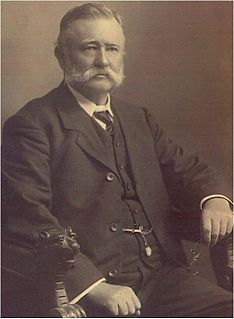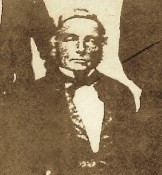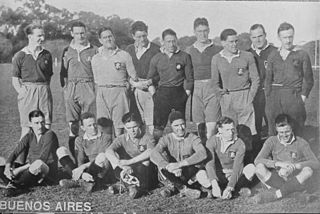The First Triumvirate was the executive body of government that replaced the Junta Grande in the United Provinces of the Río de la Plata. It started its functions on September 23, 1811, and was replaced on October 8, 1812.

Buenos Aires English High School, also known for its abbreviation BAEHS, is a bilingual school established in Belgrano, Buenos Aires in 1884 by Alexander Watson Hutton, considered "the father" of Argentine football. Watson Hutton was born in Scotland and emigrated to Argentina in 1882. The first educational institution where he worked was St. Andrew's Scots School for two years. As a keen sportsman, Watson Hutton believed that sports were of fundamental importance in education. Nevertheless, he resigned a short while later due to St. Andrew's not having funds to acquire sports facilities, which were considered by Hutton as an essential component of his teaching methods.

Carmen de Areco is a town in Buenos Aires Province, Argentina. It is the administrative centre for Carmen de Areco Partido.
The Saint Andrew's Scots School, also referred to as Saint Andrew's, is an Argentine bilingual school in Olivos, Vicente López Partido, Buenos Aires Province.

Alexander Watson Hutton was a Scottish teacher and sportsman who is considered "The Father of Argentine football". In 1893 he founded the "Argentine Association Football League". He also founded the Buenos Aires English High School and football club Alumni, which was the most successful Argentine team with 22 titles won until its dissolution in 1911.

Joaquín Canaveris was an Argentine attorney, merchant, politician and military man, who served as consignee in The Consulate of Buenos Aires. He had an active participation in the defense of Buenos Aires during the English invasions, serving as an Assistant in the battalion of Tercio de Vizcaínos.

Tomás Onésimo Canavery (1839–1913) was an Argentine Catholic priest and military chaplain, who served under the command of Bartolomé Mitre during the War of the Triple Alliance. He participated in most of the military actions against the Paraguayan forces, being promoted to lieutenant colonel in the same battlefield by order of General Juan Andrés Gelly y Obes.

James Diego Thomson (1788–1854) was a Scottish Baptist Pastor, and educator. He served as schoolmaster in South America where Thomson applied the Lancasterian system.
Robert Young (1700s–1743) was a Scottish doctor of medicine, who was employed by the South Sea Company in Buenos Aires.

Joseph Thwaites was an English trader who served as delegate in The British Commercial Rooms of Buenos Aires. He belonged to the group of British merchants, who had done business in Buenos Aires and Montevideo, between 1810 and 1830.

The Faunch Hotel was a prestigious English hotel, is considered one of the most famous in Buenos Aires during the first half of the 19th century.

Charles Alfred Huntley-Robertson was a British-Argentine rugby union player. He was the Captain of Los Pumas in 1932.

Marie Anne Périchon de Vandeuil (1775-1847), known as "la Perichona", was an aristocratic French lady, who had an active role in the politics of Buenos Aires during the Viceroyalty of the Río de la Plata.
Fonda de los Tres Reyes was an Inn or Tavern that worked in Buenos Aires in the late 18th century and early 19th. It was the main hotel and restaurant in the city, located in the neighborhood of San Nicolás, populated around 1810 by a considerable number of British and American immigrants.

Miguel Antonio Cuyar was an Argentine politician, military and merchant of Asturian origin. He had an active participation during the English Invasions, serving as Captain in the 8th Company of Asturians.

Cornelio Casablanca (1861–1945) was an Argentine financier and politician, who had an active community work in the city of Rosario where he took part in the founding of various health centers. He was a political ally of Lisandro de la Torre, with whom he ran in the elections to governor of Santa Fe Province in 1911.

Guillermo Ross was a Scottish army officer belonging to the Clan Ross and Munro by maternal line. He had a great military and political activity in the Río de la Plata, occupying the positions of sergeant major and governor of Buenos Aires.

Richard Blake Newton (1801–1868) was an English landowner. He was one of the founding members of the Argentine Rural Society.

Primera Iglesia Evangélica Metodista Buenos Aires is a temple of Methodist religion located in the city of Buenos Aires. It was the first Church of Methodist religion in South America, established in Buenos Aires since 1836.
James Florence Burke was an Irish soldier and agent in the service of the United Kingdom. He dedicated himself to the espionage in the Río de la Plata, arriving in Buenos Aires in the company of Thomas O'Gorman in 1805.















